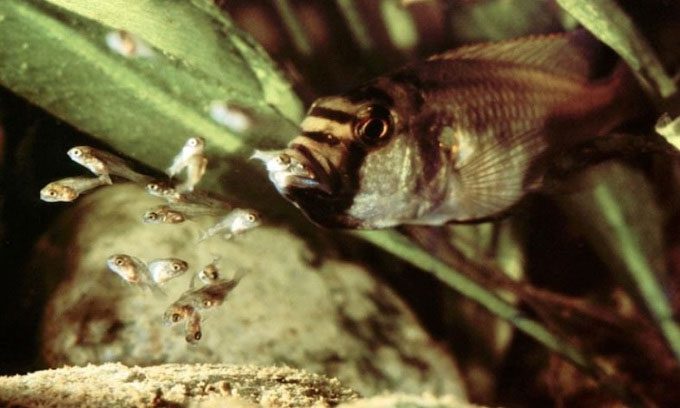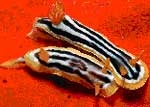The Emperor Fish in Africa Cares for Its Young in Its Mouth and Sometimes Eats Its Offspring to Boost Antioxidant Levels.
A species of Emperor Fish from Central Africa known as Burton’s Mouthbrooder (Astatotilapia burtoni) sometimes consumes more than 75% of its eggs and fry. According to Peter Dijkstra, a biologist at Central Michigan University and co-author of a study published on September 10 in the journal Biology Letters, this number is quite significant.

Mother Emperor Fish releasing fry from its mouth. (Photo: Jane Burton)
Mouthbrooding is very common in fish, particularly in Emperor Fish, which are brightly colored freshwater species often kept as ornamental fish in aquariums. After fertilization, mother A. burtoni will carry the eggs in her mouth for two weeks to protect them from predators. The eggs hatch into fry, which swim out of the mother’s mouth but return when they sense danger. This is a good start for the fry but extremely exhausting for the mother Emperor Fish. She cannot breathe or eat normally during the brooding period.
However, new research shows that mother fish can cope by consuming some of their fry in a behavior known as “fry cannibalism.” This is the first time scientists have linked this type of cannibalism to the health of the mother, according to lead researcher Jake Sawecki from the University of Michigan. The idea that a mother fish can enhance her health by eating her own offspring seems unusual, especially from an evolutionary perspective. Yet, the study’s results indicate that the significant increase in antioxidants obtained by the mother fish from this behavior likely allows them to spawn again after a few months.
In the study, Sawecki and Dijkstra raised several groups of Emperor Fish of both sexes in a laboratory at Central Michigan University. After a few weeks, the research team identified about 80 females that had recently spawned. They patiently removed all the eggs from the females’ mouths. Then, they placed about 25 eggs into the mouths of half of the females using plastic straws. The females without eggs were raised as a control group.
After two weeks of observation, researchers found that mother fish consumed an average of about 40% of their fry, and over 93% of the mothers (29 out of 31) had eaten at least a few fry. Next, they assessed the level of oxidative stress in the mother fish, measured using biochemical markers in their tissues. For instance, certain chemicals found in high concentrations in the liver can indicate oxidative imbalance, leading to cell damage, disease, and inflammation.
In three phases of the study, researchers euthanized several mother fish to examine their tissues. They found that mothers with higher levels of oxidative stress consumed more fry, thereby benefiting from the surge of antioxidants they ingested.
Despite the cannibalistic behavior, Emperor Fish remain devoted mothers, according to ichthyologist Prosanta Chakrabarty, who manages fish at the Museum of Natural Science at Louisiana State University. “Most people think that fish simply lay eggs and ignore their young, which is true for some species. But Emperor Fish are still good mothers,” Chakrabarty said.




















































